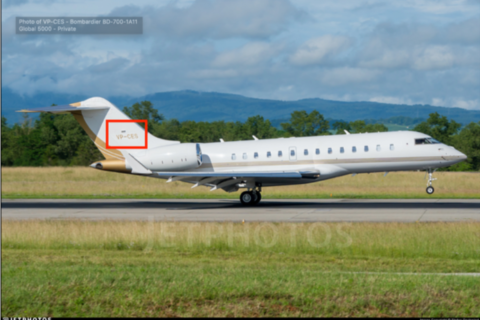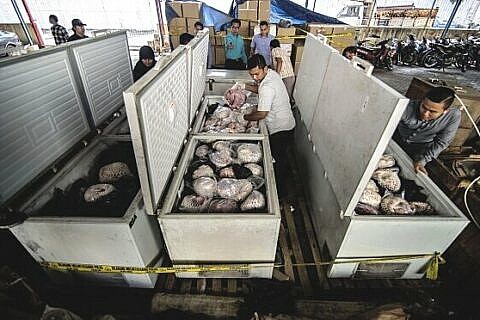Banks, Boats, and Bombs
On Tuesday, the United Nations Panel of Experts released its 2019 report on North Korea’s sanctions evasion and WMD programs. The Panel found that—even today—a limited number of trusted overseas commercial facilitators continue to engage in a wide range of revenue-generating activities for the Kim regime, often using overlapping corporate architecture that can be exposed through shared addresses and phone numbers. Li Zhengang (李振刚) and his accomplices are but the latest example.
Co-Location With Sanctioned Entities #
Chinese national Li Zhengang was first identified in the 2017 midterm report for owning 70% of UN- and US-designated Daedong Credit Bank, which OFAC sanctioned in June 2013 for supporting North Korea’s ballistic missile and WMD programs. The Panel found that Li also controlled two other companies, one of which remains active: Dandong Zhongrui Petrochemical Co., Ltd. (丹东中瑞石油化工有限公司). Zhongrui’s Chinese business registry filings indicate that it is registered in Dandong, China at Jiadi Plaza on No. 64 Binjiang Middle Road (滨江中路64号). If the address sounds familiar, that’s because it has appeared before: the same building also hosts a number of other companies sanctioned for supporting North Korea’s WMD program, including but not limited to OFAC-designated Dandong Zhicheng Metallic Material Co., the subsidiary company of OFAC-designated Dandong Hongxiang Industrial Development Co., and further still its subsidiary DPRK restaurant.
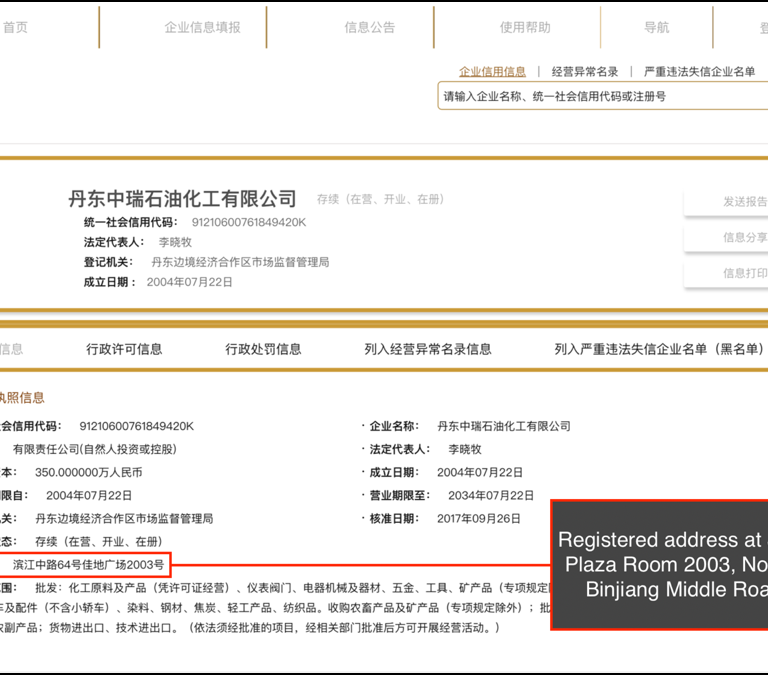
Ties to North Korean Shipping Networks #
In Tuesday’s report, the Panel showed that Li Zhengang’s network also has ties to a number of DPRK shipping operations through companies in both mainland China and Hong Kong. Chinese business registry filings show that Dandong Zhongrui shares an address with Dandong Jing’ao Trading Co. (丹东京奥贸易有限公司), with variation only in the character used to refer to room number. Dandong Jing’ao Trading appears to have had a Hong Kong-registered affiliate that used an identical name until March 14, 2017. Registry filings for both the mainland- and Hong Kong-registered Jing’ao companies list a Chinese national by the name Sun Chengguo (孙成国 or 孫成國) as director. The Panel notes that, as in the case of Dandong Zhongrui Petrochemical, Sun Chengguo used a residential address with ties to known DPRK entities: Room 916, DL1504, Youhao Building, 158 Youhao Road, Zhongshan District, Dalian, China. An almost identical address has also been used by multiple other Chinese nationals engaged in DPRK maritime sanctions evasion operations: Gu Baofu (顧寶富), the director of US- and UN-sanctioned Chang An Shipping & Technology Co., Ltd. (長安海運技術有限公司); and Pan Weichao (潘衛朝), the director of Pantech Shipping Limited (泛科海運有限公司) and an emergency contact for the Marshall Islands-based operator of the Jie Shun, a Cambodian-flagged cargo vessel that Egyptian authorities seized in August 2016 for carrying RPGs and various subcomponents from the DPRK to Africa.
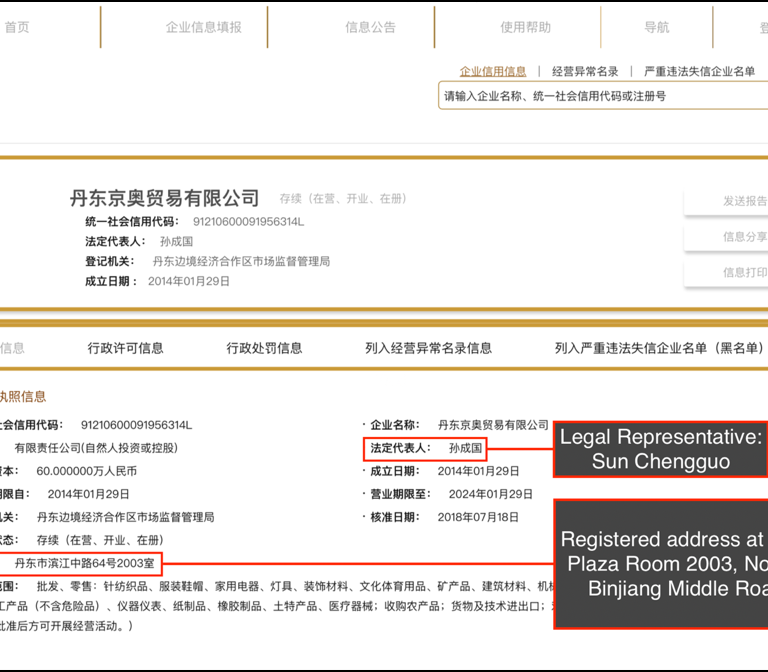
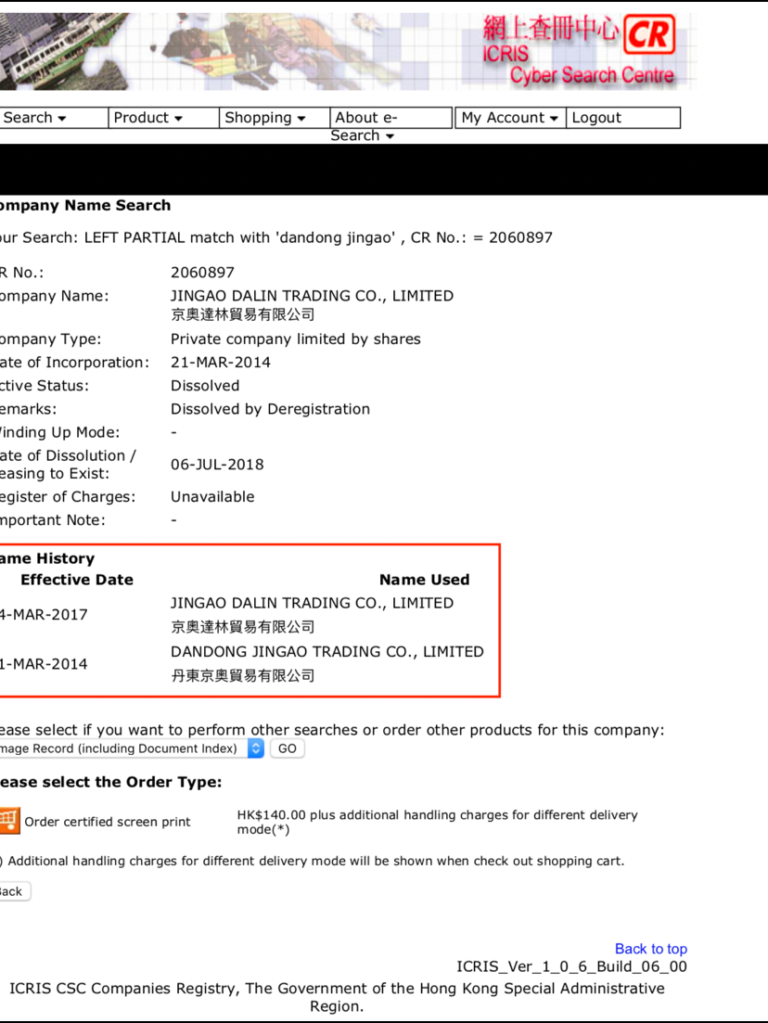
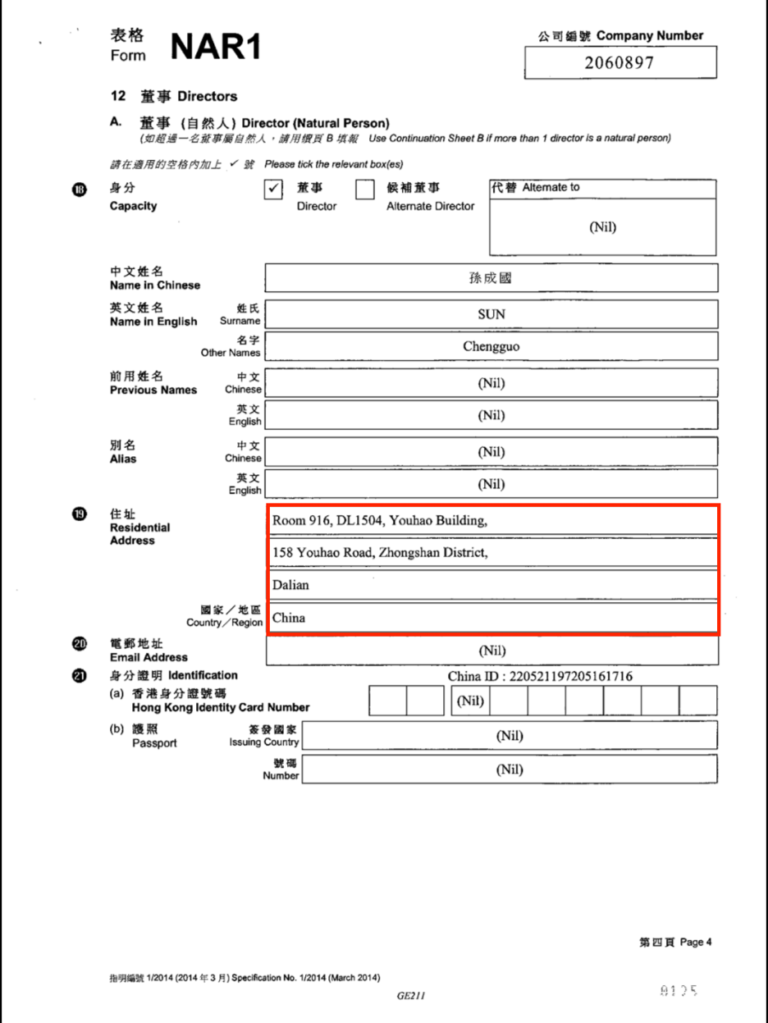
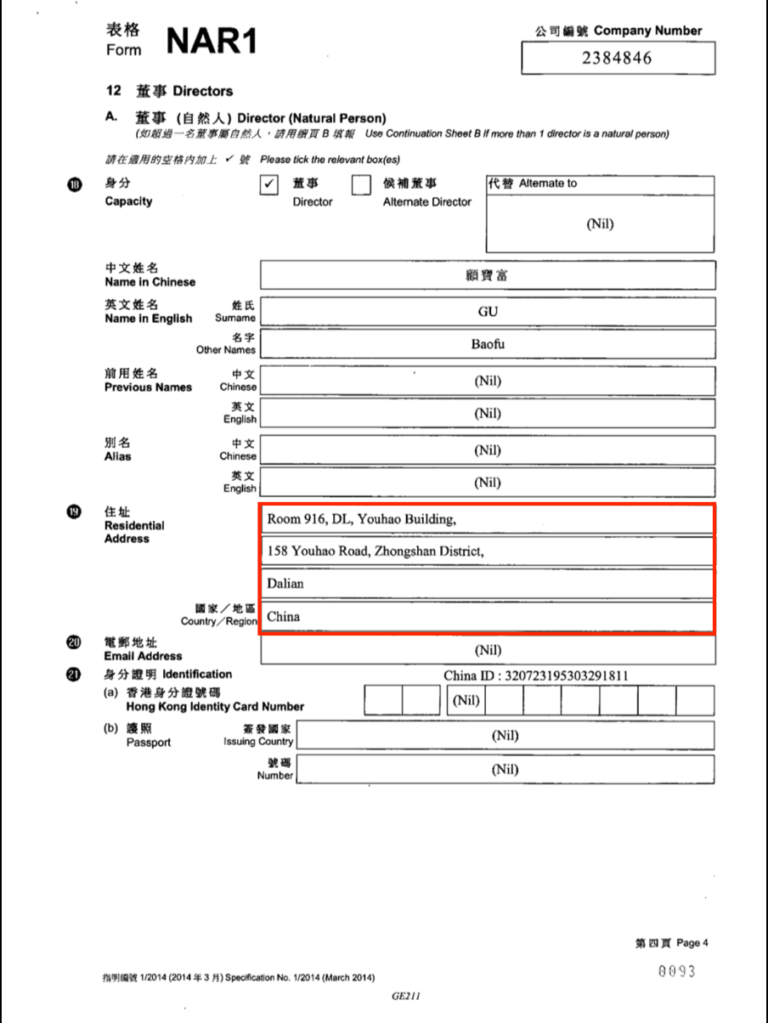
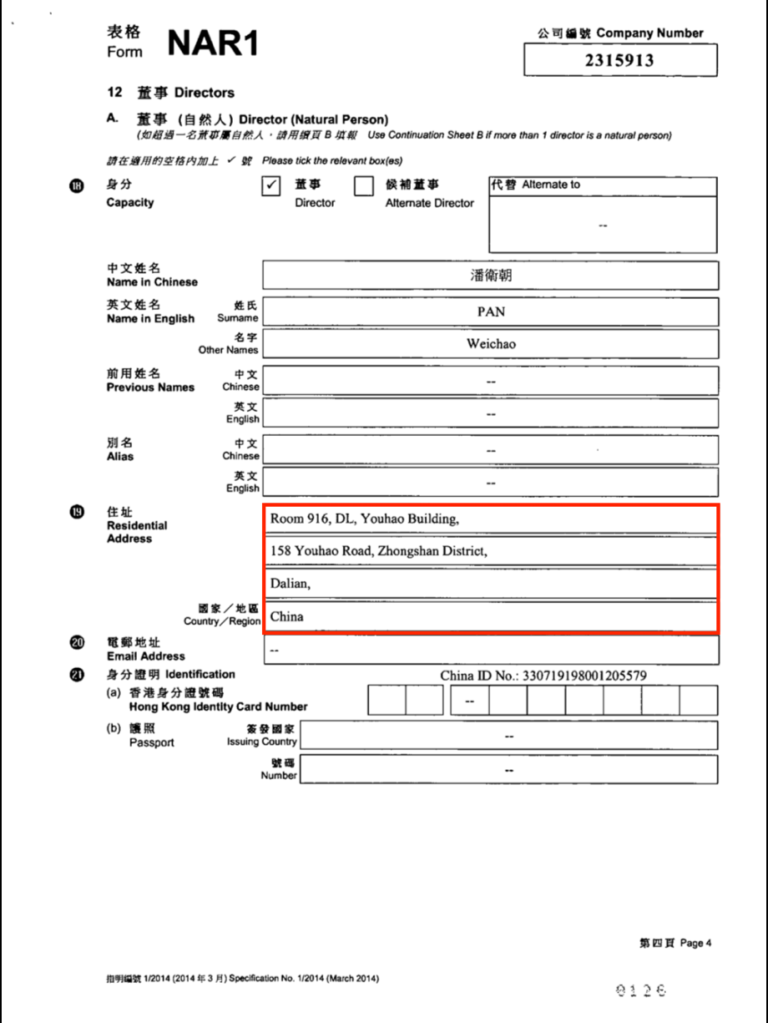
Additional Shipping Networks at the Same Address #
But Sun Chengguo, Gu Baofu, and Pan Weichao are not the only individuals who list an address at Room 916 of 158 Youhao Road. In fact, when we searched for more co-located people and companies, we found that a fourth Chinese national Ji Xiangyu (嵇相宇) used an almost identical residential address in an alleged scheme to launder prohibited DPRK coal through Far Eastern Russian ports in late 2017. On a 2017 annual return, Ji Xiangyu listed the address on a filing for his company Maple Source Shipping Limited (楓源海運有限公司), a Hong Kong-registered company whose plausible Marshall Islands-based counterpart owned the Togo-flagged Yu Yuan (IMO 95358694). In the fall of 2017, the Yu Yuan, along with other DPRK-flagged vessels, unloaded coal from North Korea at a coal terminal in Kholmsk, Russia. The coal was subsequently transshipped from Kholmsk to South Korea by several foreign-flagged vessels, one of which—the formerly Panama-flagged Sky Angel (IMO 9168441)—was managed by a Chinese company named Dalian Sky Ocean International Shipping Agency Co., Ltd. (大连天洋国际船舶代理有限公司) and is also registered at 158 Youhao Building, albeit in a different room.
The corporate network behind the Yu Yuan has changed since it was first exposed in early 2018. Equasis vessel ownership records pulled as recently as November 2018 indicated that the Yu Yuan’s owner at the time of transshipment was “in the care of” Rich Mountain Trading Co., Ltd. (富峰貿易有限公司), a second Hong Kong company of which Ji Xiangyu is the sole director and shareholder that had served as the Yu Yuan’s commercial and ISM manager at the time of transshipment. However, Rich Mountain Trading no longer appears in the Equasis database or the Yu Yuan’s ownership and management history. On Rich Mountain’s corporate filings, Ji Xiangyu reported a residential address nearly identical to that used on his first company’s filing and by Sun Chengguo, Gu Baofu, and Pan Weichao: Room 916, DL1398, Youhao Building, 158 Youhao Road, Zhongshan District, Dalian, China.
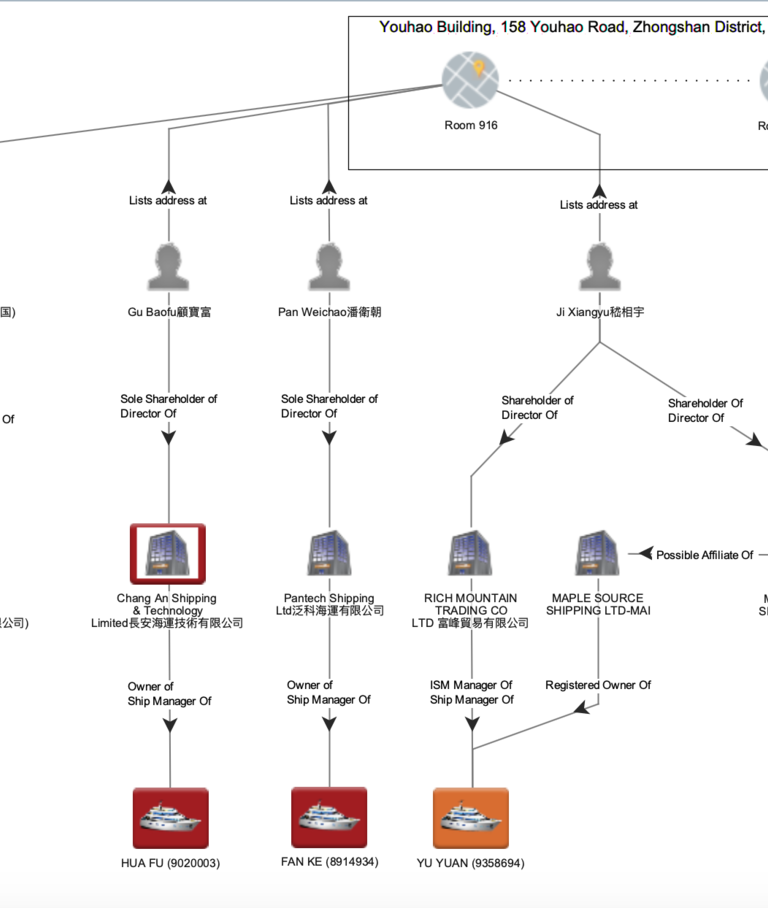
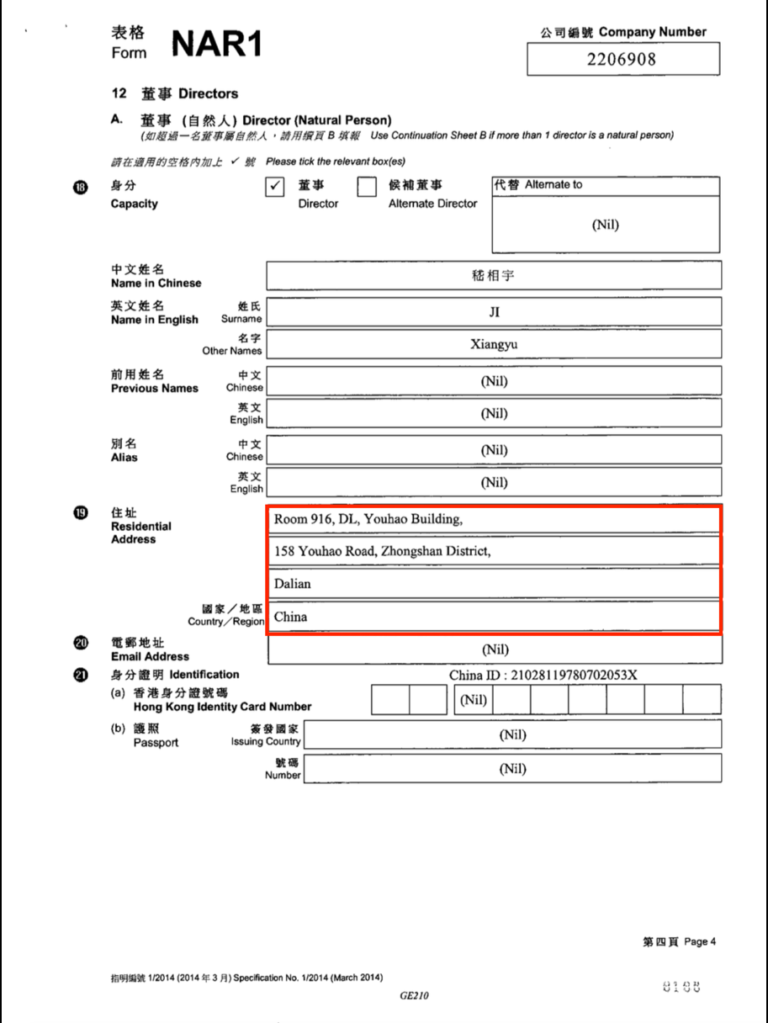
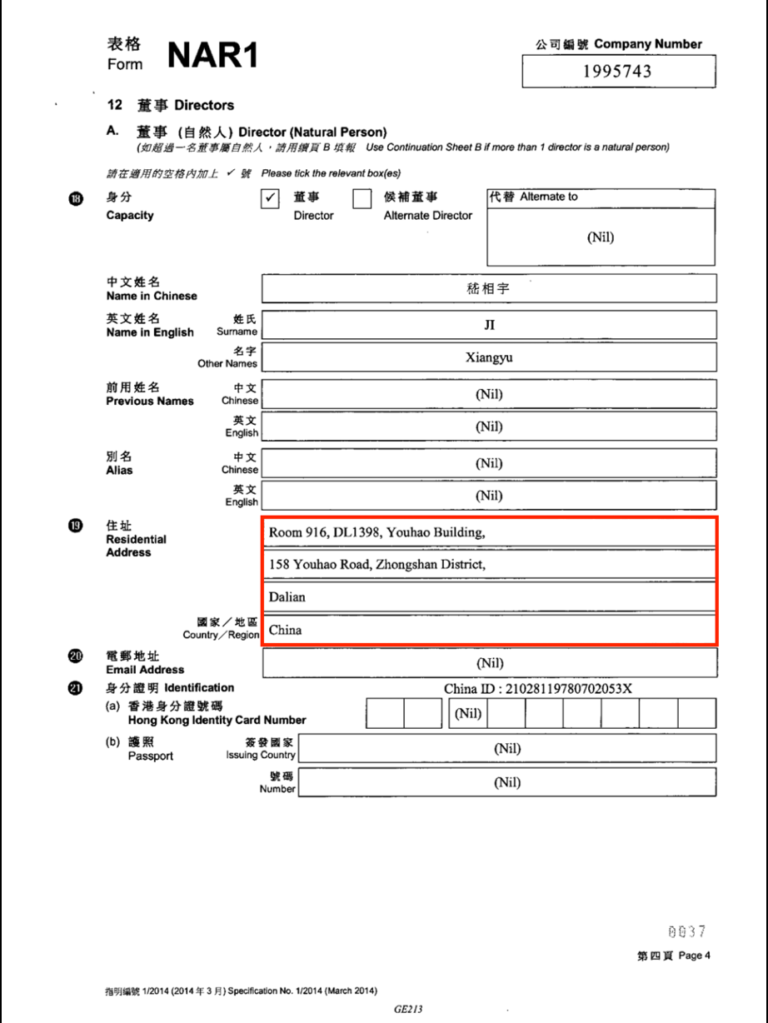
Bottom Line: Co-Location Exposes North Korea’s Overseas Commercial Networks #
North Korea’s overseas commercial operations depend on a limited number of facilitators who are both highly capable and willing to undertake significant risk. As we observed in Dispatched, there are strong economic incentives for a resource-strapped regime to co-locate its overseas activities at a limited number of physical locations. This allows them to reduce costs while engaging in bank transactions, coal sales, technology purchases, surveillance of workers, shipping operations, and other revenue-generating activities for the Kim regime. Law enforcement and civil regulators can and should use the inherent exposure of a fixed physical location to uncover the full portfolio of DPRK sanctions evasion activities.
So what else is at Dandong’s No. 64 Binjiang Middle Road, Dalian’s 158 Youhao Building, or at any other addresses associated with DPRK commercial facilitators? In any investigation, law enforcement and civil society should be sure to check.

